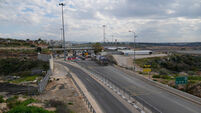Travel bans on Israeli settlers to be imposed by individual EU countries

Tanaiste Micheal Martin: 'In respect of sanctions on West Bank settlers, yes, there is disagreement but I would say that 26 member states support the idea of an EU sanctions regime against violent West Bank settlements. One would be very much opposed.' Picture: Niall Carson/PA
Travel bans against Israeli settlers are set to be imposed by individual countries after ministers failed to agree to EU-wide sanctions.
Tánaiste Micheál Martin said he had "spoken passionately" about the plight of children in Gaza, 17,000 of whom have now been left without any family, and again called for an immediate humanitarian ceasefire during a meeting of foreign ministers in Brussels.














